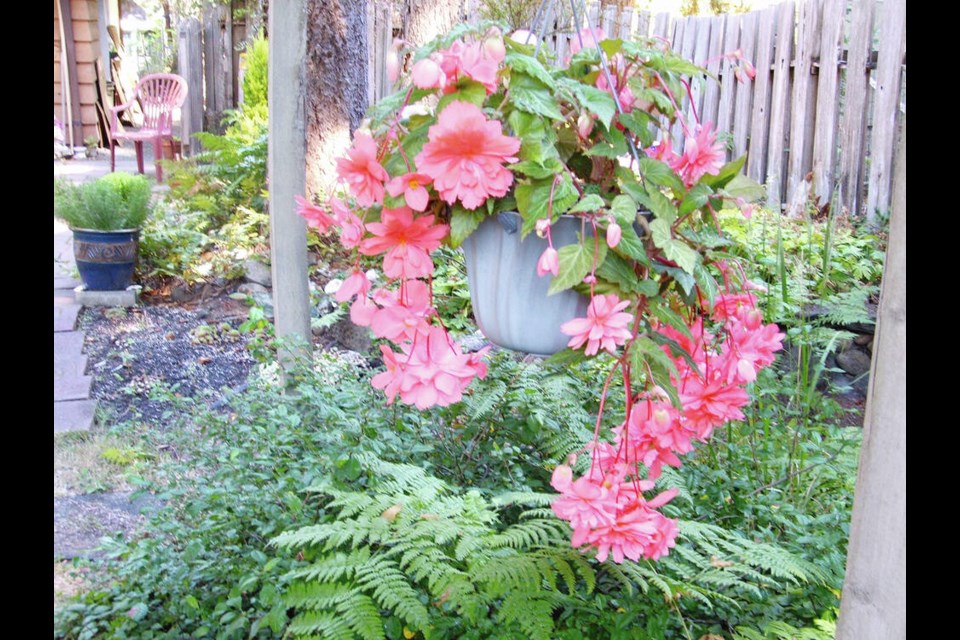Dear Helen: I noticed in a recent column that you recommended reducing water and then stopping the watering altogether for tuberous, hanging basket begonias as the weather cools in the fall. I’ve brought my hanging basket begonias inside now. Will they live in their containers through the winter?
T.D.
Outdoor tuberous begonias need to be gradually dried off as temperatures begin dipping toward single digits in the fall. This is to gently mature the tuber and set it up for successful winter storage once top growth has fallen away. Tubers store best covered lightly with vermiculite or a similar medium and placed in cool but frost-free, dark conditions.
Dear Helen: Our back garden has a southern exposure, full sun and, through the past summer and beyond, a thick infestation of whitefly including on dahlia, hydrangea, clematis and begonia plants. How do I prevent these clouds of whitefly from forming next year?
L.I.
Whiteflies that infest and weaken outdoor garden plants by sucking out their juices do not survive winters here. Infestations as heavy as you describe must have begun early in the season, most likely introduced to the garden on acquired transplants that were already infested.
Early entry into the garden would have allowed populations to build, with many generations of the flies over the season.
To prevent a repeat infestation, either grow your own transplants from seed or carefully inspect plants before bringing them home. Look for tiny, dark eggs and scale-like larvae on leaf undersides.
Dear Helen: We were interested in a recent article about growing coffee plants indoors and wondered whether you had ever tried growing one. Are they hardy outdoors here? Are the plants commonly available?
J.G.
Coffee plants are not frost hardy and are grown as house plants here. I don’t have one now, but I have grown this house plant in years past. I remember my plant as very attractive, with glossy, dark green leaves.
Plants should be available in Victoria. Even in my small town local nurseries often have Coffea arabica plants to sell. This is the variety with self-pollinating (perfect”) flowers, meaning that, as in tomato plants, each flower has both male and female parts.
These are rain forest plants of equatorial zones. During my year teaching in Uganda, I remember walking through a coffee plantation at the base of a mountain near the eastern border of Uganda, on a trek up the mountain with a group of other teachers. The coffee plants grew in bright shade under a canopy of trees.
In our homes, the plants do well in bright indirect light with high humidity levels, ideally in a 15 to 24 C temperature range. The plants can be kept compact with a light early spring pruning.
Expectations of a bountiful harvest of coffee beans from a plant or two need to be tempered with high levels of patience, dedication to hand pollinating, and acceptance that an eventual harvest will be very modest. Hand pollinating is accomplished by moving a soft artist’s brush from flower to flower, transferring pollen from the male to the female parts of the blooms.
To flower and form berries containing coffee beans, a plant needs to be fairly mature, at least a few years old.
GARDEN EVENTS
Gordon Head meeting. The Gordon Head Garden Club will meet this evening (Wednesday, Nov. 1) from 7 to 9 p.m. in the Gordon Head Lawn Bowling Club, 4105 Lambrick Way. Jayne Collier, manager of the Wild Birds Unlimited store, will speak about Winter Bird Feeding and rat proofing feeders. Visitors are welcome at no charge. The evening includes a parlour show and raffle.
Dahlia meeting. The Victoria Dahlia Society will meet on Thursday, Nov. 2, at 7 p.m. in St. Michael’s Church hall, 4733 West Saanich Rd. This will be the society’s AGM, followed by a presentation: “My Favourite Dahlias” — a slide show featuring 25 varieties of dahlia, chosen and described as favourites by 15 club members. Everyone is welcome.
VHS meeting. The Victoria Horticultural Society will meet on Tuesday, Nov. 7, from 7:30 to 9 p.m. in the Garth Homer Centre, 813 Darwin Ave. Gary Lewis, owner of Phoenix Perennials in Richmond, will offer a companion presentation to his recent book, The Complete Book on Ground Covers: 400 Plants that Reduce Maintenance, Control Erosion, and Beautify the Landscape. Non-member drop-in fee $5. vichortsociety.org.



